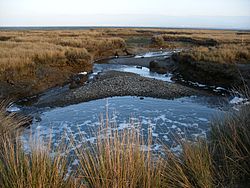Wiyot

Humboldt Bay near Eureka, traditional Wiyot lands
|
|
| Total population | |
|---|---|
| (450) | |
| Regions with significant populations | |
|
|
|
| Languages | |
| English, historical Wiyot | |
| Related ethnic groups | |
| Yurok |
The Wiyot (Chetco-Tolowa: Wee-’at Yurok: Weyet ) are an indigenous people of California living near Humboldt Bay, California and a small surrounding area. They are culturally similar to the Yurok people. Today, there are approximately 450 Wiyot people. They are enrolled in several federally recognized tribes, such as the Wiyot Tribe (also known as the Table Bluff Reservation—Wiyot Tribe), Bear River Band of the Rohnerville Rancheria, Blue Lake Rancheria, and the Cher-Ae Heights Indian Community of the Trinidad Rancheria.
The Wiyot and Yurok are the westernmost people to speak an Algic language. Their languages, Wiyot and Yurok, are distantly related to the Algonquian languages. The Wiyot people's traditional homeland ranged from Mad River through Humboldt Bay (including the present cities of Eureka and Arcata) to the lower Eel River basin. Inland, their territory was heavily forested in ancient redwood. Their stretch of shoreland was mostly sandy, composed of dunes and tidal marsh.
The Wiyots were among the last natives in California to encounter white settlers. Spanish missions extended only as far north as San Francisco Bay. Following a brief visit in 1806,Russian fur traders, whose 18th-century invasion in search of the sea otter had devastated the Pomo, were uninterested the area, which was not a sea-otter habitat. The way of life of the Wiyot people, after many centuries of isolated development, was forever changed, if not completely destroyed, as a result of settlement by Europeans. The Josiah Gregg exploring party spent the turn of the years 1849–1850 at Humboldt Bay; subsequent to their return to San Francisco several ships set out to settle the bay. The crew of seafarer Douglass Ottinger became, in 1850, the first Americans to enter Humboldt Bay. White settlement followed swiftly.
...
Wikipedia
